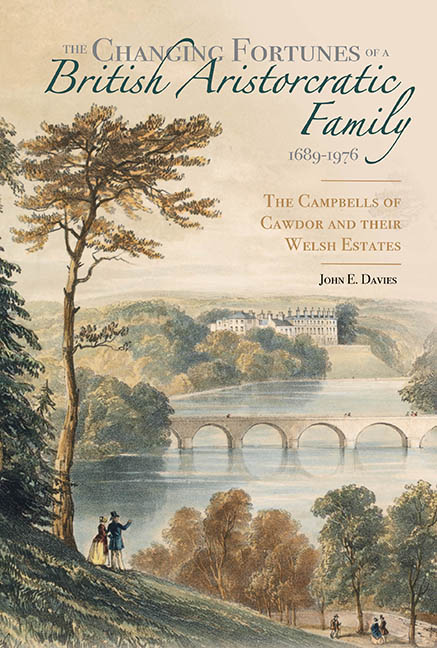 The Changing Fortunes of a British Aristocratic Family, 1689–1976
The Changing Fortunes of a British Aristocratic Family, 1689–1976 Book contents
- Frontmatter
- Contents
- List of Illustrations
- Acknowledgements
- List of Abbreviations
- Pedigree
- Introduction
- 1 Cawdor and Campbell
- 2 Estate Administration
- 3 The Agricultural Estate: The Cawdors as Farmers and Landlords
- 4 The Cawdors as Industrial Landowners
- 5 The Cawdors in the Community: Church and Education
- 6 The Mêlée of Local Governance
- 7 The Cawdors in Politics: Interest Building, Consolidation and Decline
- 8 Private and Exclusive Lives
- 9 The End of the Welsh Estates
- Conclusion
- Bibliography
- Index
- Frontmatter
- Contents
- List of Illustrations
- Acknowledgements
- List of Abbreviations
- Pedigree
- Introduction
- 1 Cawdor and Campbell
- 2 Estate Administration
- 3 The Agricultural Estate: The Cawdors as Farmers and Landlords
- 4 The Cawdors as Industrial Landowners
- 5 The Cawdors in the Community: Church and Education
- 6 The Mêlée of Local Governance
- 7 The Cawdors in Politics: Interest Building, Consolidation and Decline
- 8 Private and Exclusive Lives
- 9 The End of the Welsh Estates
- Conclusion
- Bibliography
- Index
Summary
Eighteenth- and nineteenth-century society was imbued with paternalism, which, as the nineteenth century advanced, became increasingly at odds with the forces of laissez-faire economics and representative local government bodies. The other side of this all-pervasive paternalism was a degree of deference, a state of mind which it is difficult to imagine in the early twenty-first century. It is from this perspective of paternalism and the associated deference that judgements regarding the Cawdor estate should be taken. From their paternalistically-fuelled largesse the proud Cawdors expected all those lower down the class chain to offer them large quantities of obsequious respect. And for the most part, those looking upwards to Stackpole Court, Golden Grove and Cawdor Castle accepted that this was the natural order of life.
Since the basis of the Cawdors’ paternalistic world lay in their ownership of extensive property, which impinged upon a large percentage of the population, we will begin by commenting upon the estate's position in its community. Most immediately affected by the estate were, of course, the tenants, who managed their lands and provided a rental which enabled the Cawdors to indulge in their aristocratic way of life. While taking due cognisance of the cases of political coercion and eviction, and raising, too, the distinct possibility that there was more ill-treatment of tenants by gamekeepers than the evidence reveals, the Cawdor estate was, on the whole, not harsh to its tenants. In fact there is plenty of evidence to suggest the opposite: the all-pervading paternalism ensured that both landowners and agents displayed care towards their tenants, even if it meant a good deal of deferential forelock-pulling on the part of the latter. From a pragmatic standpoint, a good relationship with their tenants was more likely to produce positive results on rent audit days. The estate was realistic when it came to selecting tenants. Ideally they would have preferred a tenantry of established church members, but they appreciated that, particularly in the late nineteenth century and especially so in Carmarthenshire, such could never be the case, though Mousley was not averse to ‘converting’ any tenants he thought likely candidates.
- Type
- Chapter
- Information
- The Changing Fortunes of a British Aristocratic Family, 1689–1976The Campbells of Cawdor and their Welsh Estates, pp. 298 - 304Publisher: Boydell & BrewerPrint publication year: 2020
